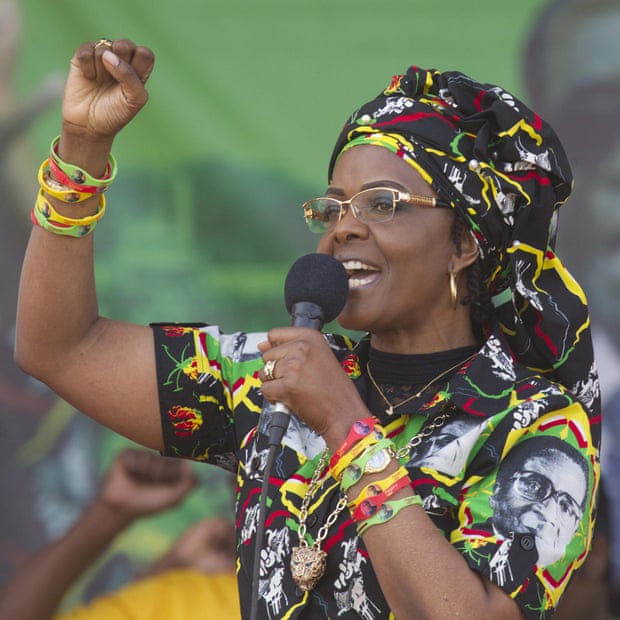The whereabouts of Grace Mugabe, whose political ambitions prompted the military takeover in Zimbabwe on Tuesday, are not entirely clear.
Reports that the first lady had left for Windhoek, the capital of Namibia, were denied by local authorities.
Neither has it been possible to stand up reports placing the 52-year-old second wife of President Robert Mugabe in Botswana, Dubai or Malaysia, where the Mugabe family own property.
It seems most likely that the woman dubbed “Gucci Grace” because of her shopping habit is still holed up in the “Blue House”, the sprawling mansion in the upscale Borrowdale neighbourhood of Harare, where she lives with the president.
Multiple sources in Zimbabwe and South Africa, including officials who claim direct knowledge of the ongoing negotiations between Mugabe and the army over the transition of power in the former British colony, said that Grace was present in the Harare residence on Tuesday night when the army detained the 93-year-old autocrat. She has not moved since, they said.
In an address to the nation on state TV following the takeover, the army referred to the “family” of Mugabe being “safe” in its custody, as well as the president himself.
“Her future is part of the discussions. The army won’t let her go anywhere until [Mugabe] has stepped down,” said one South Africa-based diplomatic official.
Others point out that it would be unlikely that the former typist, who married the president in 1996, would abandon her husband at such a critical time.
“I would be very surprised if she would leave the side of the president when the negotiations were going on. She’s not that kind of person,” said Priscilla Misihairabwi-Mushonga, an opposition member of parliament.
The whereabouts of the couple’s two sons and daughter are unknown, though the sons, aged 25 and 21, are believed to have been in Johannesburg shortly before the military moved in earlier this week.
Their mother has spent millions of dollars in recent years acquiring property in upscale neighbourhoods of the South African capital. However, her alleged assault on a local model this summer in a luxury apartment rented by her sons has led to legal problems that have made the neighbouring state less attractive as a bolthole.
ProfileWho is Grace Mugabe and why is she controversial?
Show

Background
Grace Mugabe is the 52-year-old first lady of Zimbabwe. Born in South Africa, she married Robert Mugabe, 40 years her senior, in 1996. Initially struggling to emerge from the shadows of the president’s popular first wife, Sally, who died in 1992, Mugabe appeared by her husband’s side for official functions but rarely got involved in politics herself, focusing publicly on her charity work while gaining a reputation for legendary shopping expeditions.
Controversies
In 2009 a British photographer alleged that she punched him repeatedly in the face when he tried to take a picture of her in Hong Kong. She has since been implicated in several incidents outside Zimbabwe: in Singapore, in Malaysia and most recently in South Africa, where she allegedly assaulted a model in August.
Political ambitions
The unveiling of Grace Mugabe as a potential successor to her husband began in 2014, when she became head of the ruling party’s women’s league and the state propaganda machine began talking up her political acumen. Before the events of 14 November her path to power had received a boost when her main rival, the vice-president , Emmerson Mnangagwa, was fired on 6 November. The feud between Mugabe and Mnangagwa had been bitter – in October she publicly denied poisoning him after he fell ill at a rally in August.
The military intervention on Tuesday night was in large part aimed at thwarting Grace Mugabe’s bid for power.
Ten days ago, Robert Mugabe sacked his vice president Emmerson Mnangagwa, a longtime ally, angering senior officers who saw the move as a direct threat to their interests.
Not only did it put Grace Mugabe in pole position to take over from the ageing president, but it was also seen as the first stage of a wider purge of dozens of senior officers and officials.
The battle was not just between personalities. It pitted Grace Mugabe’s G40 faction of young and brash politicians against the older veterans of the liberation wars of the 1970s and 1980s, who were closer to Mnangagwa. Those in the G40 saw the older generation as blocking their route to political power and self-enrichment. Many are now in detention with futures as uncertain as that of the first lady.
Martin Rupiya, an analyst and former general in the Zimbabwean Defence Forces, said the military takeover was aimed at realigning the ruling class. “The G40 did not have roots in a politicised military. It was a creation of the presidency,” Rupiya said.
So too, was the power of the first lady, as she has now learned.








